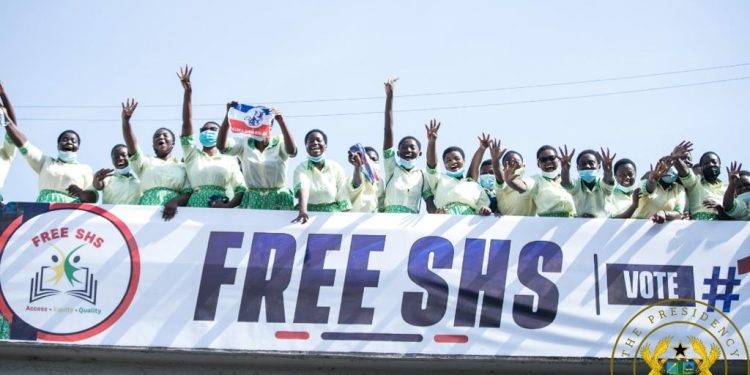Child Rights International has firmly opposed recent proposals to transfer the financial burden of feeding students under Ghana’s Free Senior High School (Free SHS) policy to parents. The organization, known for its advocacy on children’s rights and welfare, released a statement on January 11, 2025, emphasizing the importance of safeguarding the core objectives of the Free SHS program. It described the policy as a groundbreaking initiative that has revolutionized access to secondary education since its launch in 2017.
The Free SHS policy, designed to remove financial barriers to education, covers tuition, feeding, accommodation, and other related costs. Its implementation has enabled millions of Ghanaian students, particularly those from disadvantaged backgrounds, to attend senior high school. However, ongoing debates about the policy's sustainability have brought to light challenges such as overcrowding, funding delays, and logistical issues, prompting some to suggest reforms, including shifting feeding costs to parents.
Advocacy for Education Inclusivity
In its statement, Child Rights International highlighted that requiring parents to shoulder the cost of feeding would undermine the foundational principles of the Free SHS program. The organization stressed that the policy’s primary goal is to ensure inclusivity and equal opportunities for all children, regardless of their economic status.
The group argued that transferring the financial burden of feeding to parents would disproportionately affect low-income families, particularly those in rural and underserved communities. Such a move, they said, could reverse the gains made in increasing school enrollment and reducing dropout rates.
“Shifting feeding costs to parents will only deepen inequality and make education less accessible for those who need it the most,†the statement read. “The Free SHS policy is a social intervention aimed at bridging the gap between the privileged and underprivileged. Any attempts to alter this balance will defeat the purpose of the initiative.â€
The Impact of Free SHS on Education
Since its inception, the Free SHS program has been celebrated as a transformative policy that has expanded access to education across Ghana. By removing the financial barriers that previously hindered many families, the policy has significantly increased enrollment in senior high schools.
In rural areas, where poverty rates are often higher, the program has had an especially profound impact. Families that previously struggled to afford school fees and related costs can now send their children to school without financial strain. This has led to improved literacy rates and created opportunities for social mobility.
Child Rights International noted that the policy has also contributed to reducing dropout rates, particularly among girls, who are often forced to abandon their education due to financial constraints or societal pressures. The organization urged stakeholders to prioritize these achievements when considering reforms.
Challenges Facing the Free SHS Policy
While the Free SHS program has received widespread praise, it has not been without its challenges. Overcrowded classrooms, inadequate infrastructure, and logistical difficulties related to feeding and resource allocation have strained the system. Critics have also pointed to delays in the disbursement of funds, which sometimes disrupt the smooth operation of schools.
These issues have fueled debates about the sustainability of the program. Some stakeholders argue that reforms are necessary to address the challenges and ensure the program’s long-term viability. However, Child Rights International warned that such reforms must not compromise the policy’s core objectives.
A Call for Holistic Solutions
In its statement, Child Rights International urged policymakers to explore alternative solutions to address the challenges facing the Free SHS program. The organization recommended increased government investment in education infrastructure and improved efficiency in resource allocation as better approaches to tackling the program’s shortcomings.
The group also called for greater collaboration between the government, civil society organizations, and the private sector to support the Free SHS initiative. By pooling resources and expertise, stakeholders can work together to address the program’s challenges without undermining its inclusivity.
“Any reforms to the Free SHS policy must be guided by the principle of equity and the need to protect the rights of every Ghanaian child to quality education,†the statement emphasized.
Broader Implications
Child Rights International’s opposition to shifting feeding costs to parents highlights broader concerns about the direction of Ghana’s education policies. The organization’s stance reflects a growing demand for policymakers to prioritize social equity and ensure that reforms do not exacerbate existing inequalities.
The Free SHS program has become a symbol of hope for many Ghanaian families, offering a pathway to a brighter future for their children. As debates about its sustainability continue, stakeholders must carefully weigh the potential impact of proposed changes on the program’s beneficiaries.
Public Reaction
The statement from Child Rights International has sparked widespread discussion, with many Ghanaians expressing support for the organization’s position. Parents, educators, and advocacy groups have echoed calls for the government to maintain the current structure of the Free SHS program.
Critics of the proposal to shift feeding costs to parents argue that it would place an additional financial burden on families already struggling to make ends meet. They contend that such a move would be counterproductive, potentially forcing some children to drop out of school due to financial constraints.
A Test of Political Will
As the government considers its options, the debate over the Free SHS program’s future will test its commitment to education as a fundamental right. Child Rights International has made it clear that any changes to the program must prioritize the welfare of Ghanaian children and uphold the principles of inclusivity and equity.
For many, the Free SHS policy represents a critical investment in the nation’s future. The stakes are high, and the decisions made in the coming months will have far-reaching implications for the education sector and the lives of countless Ghanaian students.
The call to protect the integrity of the Free SHS program serves as a reminder that education is not just a policy issue—it is a fundamental human right that must be safeguarded at all costs.



No comments yet
Be the first to share your thoughts!